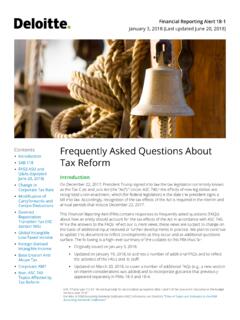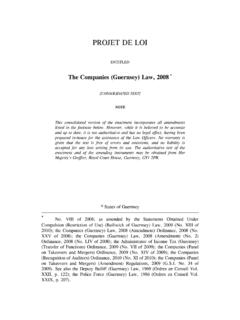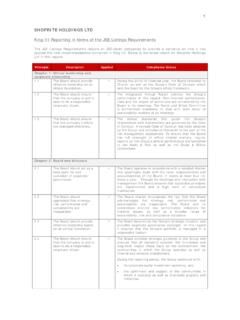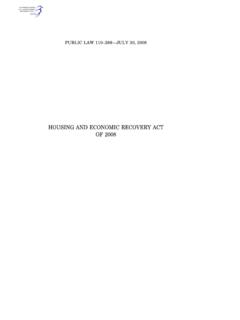Transcription of The Companies Act Implications for directors and ...
1 1 Southern Africa Accounting & Auditing June 2013 The Companies Act Implications for directors and prescribed officers Introduction The Companies Act (the Act) contains a number of provisions that will directly impact all directors and the prescribed officers. The provisions relate to: The codified standard of conduct. Personal liability where a third party suffers loss or damage where a director or prescribed officer did not adhere to the standard of conduct. Declaration of conflicts of interest and the consequences of non-compliance. Disclosure of all remuneration received by directors and prescribed officers in the annual financial statements. It is important to take note of these provisions, and to ensure that all directors and prescribed officers meet the requirements of the Companies Act, and are aware of the implication and potential consequences of non-compliance with the new Act.
2 Identifying directors and prescribed officers directors The term director has been defined in law. The Companies Act, 2008 (the Act) defines a director as: A member of the board of a company .., or an alternate director of a company and includes any person occupying the position of director or alternate director, by whatever name designated . In terms of section 66 of the Companies Act, the business and affairs of a company must be managed by or under the direction of its board, which has the authority to exercise all of the powers and perform any of the functions of the company. 2 In general terms, the directors of a company are those individuals empowered by the Memorandum of Incorporation of that company to determine its strategic direction. As a consequence of the nature of a company, being a lifeless corporate entity, human intervention is required to direct its actions and therefore determine its identity.
3 The directors are entrusted by the shareholders of the company with the ultimate responsibility for the functioning of the company. While some of the day-to-day running of the company is generally delegated to some level of management, the responsibility for the acts committed in the name of the company rests with the directors . Prescribed officers The Companies Act determines that prescribed officers are required to perform their functions and exercise their duties to the standard of conduct as it applies to directors . Prescribed officers will be subject to the same liability provisions as it applies to directors . Prescribed officers include every person, by whatever title the office is designated, that: Exercises general executive control over and management of the whole, or a significant portion, of the business and activities of the company; or Regularly participates to a material degree in the exercise of general executive control over and management of the whole, or a significant portion, of the business and activities of the company.
4 It is important for Companies to identify the prescribed officers. They need to ensure that these persons meet the requirements of the Companies Act, and ensure that they understand the Implications and potential consequences of accepting appointment to the particular office. Qualifications to serve as a director or prescribed officer With a few specific exceptions, anyone can be appointed as a director or prescribed officer of a company. The Companies Act is the primary determinant of who may or may not be appointed to be a director or prescribed officer. A company s Memorandum of Incorporation may provide additional grounds for ineligibility or disqualification, or additional minimum qualifications that should be met by directors . Section 69 of the Companies Act provides that any person is ineligible for appointment as director or prescribed officer, if that person is a juristic person, an unemancipated minor (or is under a similar legal disability), or does not satisfy the qualifications as per the company s Memorandum of Incorporation.
5 Also, a person is disqualified from being a director or prescribed officer, if the person: Has been prohibited to be a director by the court. 3 Has been declared by the court to be delinquent in terms of this Companies Act or the Close Corporations Act. Is an unrehabilitated insolvent. Is prohibited in terms of any public regulation to be a director of the company. Has been removed from an office of trust, on the grounds of misconduct involving dishonesty. Has been convicted and imprisoned without the option of a fine, or fined more than R1 000 for theft, fraud, forgery, perjury or an offence under the Companies Act, the Insolvency Act, the Close Corporations Act, the Competition Act, the Financial Intelligence Centre Act, the Securities Services Act, or the Prevention and Combating of Corruption Activities Act.
6 The Companies Act provides the courts with wide discretion to either extend any disqualification for no longer than a period of five years at a time, or to exempt any person from the disqualifications as set out above. The Companies Act determines that the appointment of an ineligible or disqualified person as director or prescribed officer is null and void. Deemed resignation In terms of the Transitional Arrangements set out in Schedule 5 of the Companies Act, a person holding the office of director or prescribed officer immediately before the implementation of the new Companies Act (that is ineligible or disqualified from appointment in terms of the provisions of the Companies Act) is regarded to have resigned that office as from the effective date of the Act. This implies that all Companies have to determine which officers will be classified as prescribed officers once the new Companies Act becomes effective.
7 If any of these persons are ineligible or disqualified from appointment, they have to be removed from those positions and replaced by persons that meet the requirements set out in the Companies Act. Failure to do so may result in potential liability for the company, as the decisions and actions of disqualified prescribed officers will be regarded as void. The standard of directors conduct By accepting their appointment to the position, directors and prescribed officers agree that they will perform their duties to a certain standard, and it is a reasonable assumption of the shareholders that every individual director and prescribed officer will apply their particular skills, experience and intelligence to the advantage of the company. The Companies Act codifies the standard of directors conduct in section 76.
8 The standard sets the bar 4 for directors very high. The intention of the legislature seems to be to encourage directors to act honestly and to bear responsibility for their actions - directors should be accountable to shareholders and other stakeholders for their decisions and their actions. However, with the standard set so high, the unintended consequence may be that directors would not be prepared to take difficult decisions or expose the company to risk. Since calculated risk taking and risk exposure form an integral part of any business, the Companies Act includes a number of provisions to ensure that directors are allowed to act without constant fear of personal exposure to liability claims. In this regard, the Companies Act has codified the business judgement rule, and provides for the indemnification of directors under certain circumstances, as well as the possibility to insure the company and its directors against liability claims in certain circumstances.
9 The codified standard applies to all directors , prescribed officers or any other person who is a member of a board committee irrespective of whether or not that the person is also a member of the company s board. The Act makes no distinction between executive, non-executive or independent non-executive directors . The standard, and consequent liability where the standard is not met, applies equally to all directors . In terms of this standard, a director (or other person to whom section 76 applies), must exercise his or her powers and perform his or her functions: In good faith and for a proper purpose In the best interest of the company, and With the degree of care, skill and diligence that may reasonably be expected of a person carrying out the same functions and having the general knowledge, skill and experience of that director.
10 The Companies Act prohibits a director from using the position of director, or any information obtained while acting in the capacity of a director, to gain an advantage for himself or herself, or for any other person (other than the company or a wholly-owned subsidiary of the company), or to knowingly cause harm to the company or a subsidiary of the company. directors have a fiduciary duty to act in the best interest of the company as a whole. directors owe this duty to the company as a legal entity, and not to any individual, or group of shareholders not even if the majority shareholder appointed the director. directors are obliged to act in good faith in the best interest of the company. They should act within the bounds of their powers, and always use these powers for the benefit of the company.


















